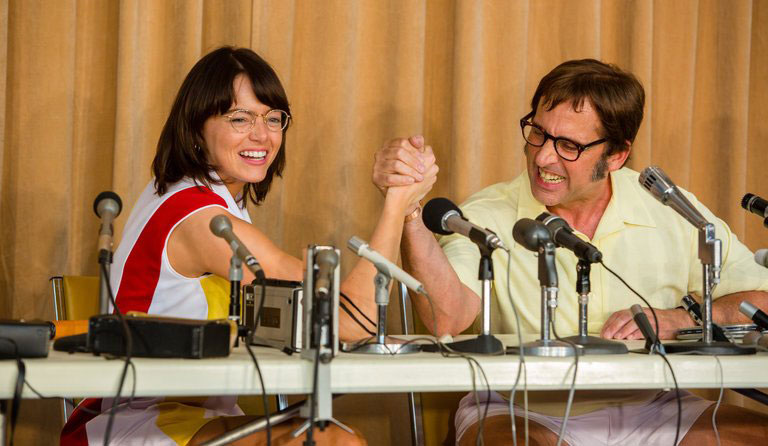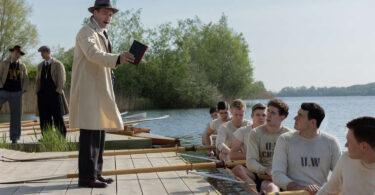Emma Stone as Billie Jean King and Steve Carell as Bobby Riggs in the new film “Battle of the Sexes.” PHOTO: MELINDA SUE GORDON/20TH CENTURY FOX
Gail Arneke
Battle of the Sexes, Directed by Jonathan Dayton, Valerie Ferris; Actors: Emma Stone (Billie Jean King), Steve Carell (Bobby Riggs), Andrea Riseborough (Marilyn Barnett), Bill Pullman (Howard Kramer), Sarah Silverman (Gladys Heldman), Jessica McNamee (Margaret Court), Austin Stowell (Larry King), Elisabeth Shue (Priscilla Riggs), Alan Cumming (Ted Lining, Natalie Morales(Rosie Casals), Howard Cosell (his late self).
A person with little knowledge of the history of tennis (me) can learn a lot by researching the 1970s for a review of “Battle of the Sexes.” The story, of course, deals with the match many remember well—Billie Jean King versus Bobby Riggs in 1973.The match was something of a stunt, a challenge and a turning point.
The movie opens with Billie Jean King arguing to promoter (and former tennis champion) Jack Kramer that women players should be paid more, as their events paid a pitiful amount compared to men, although they drew equal audiences. This plea fell on deaf ears.
King, with Gladys Heldman (tennis champion, founder of Tennis World magazine) along with a group of woman players known as the Houston Nine, then find funding and start the Virginia Slims tour, at the risk of cutting themselves from the tennis hierarchy. They are, of course, highly successful.
Bobby Riggs (also a champion, number one men’s player for three years, winner of four Grand Slam titles) was, by 1973, a 55-year-old has-been, eking out a living on the senior circuit, holder of a serious gambling habit, married to a young wife and raising yet another son.
This was an era where the term “male chauvinist” was in wide usage, and Riggs prided himself on being one. He gambled on what he considered a sure thing—that he could beat any current woman player. He played Margaret Court, to some fanfare, and beat her for a $35,000 purse. Riggs then doubled down, and the match with Billie Jean King was born, carrying a $100,000 purse. It was spectacle.
Ninety million network viewers saw the match. The players were borne onto the court in throne-like chairs. Riggs was surrounded by cheerleaders. He carried his male chauvinist mantle proudly, and he was soundly beaten. It was not that he was merely old and out of shape. He was beaten by King’s strategy and skill. He did more for women’s tennis than he could have imagined.
That is the story. What animates the movie is the strongly developed characters and their lives off the court. Riggs, with his gambling issue, is threatened with divorce. When Priscilla, his wife, talks him into Gamblers’ Anonymous, he rallies his fellow addicts with the heartfelt admonition “Life’s a gamble! Why change the one thing you love?” They nod in agreement. The guy is a salesman, and he can get people to buy.
Meanwhile, Billie Jean King is discovering her sexuality and having an affair with a hairdresser who becomes her friend and confessor. Only Marilyn sees all of her fears and weaknesses, and Marilyn responds nobly. As does Larry King (not that one), Billie Jean’s supportive husband. Somehow, these folks, Marilyn and Larry, seem a bit too good to be true, but it works.
A bit of humor and another snatch of history comes from Ted Linling (played by the actor who also played Eli Gold in “The Good Wife”), the Virginia Slims costumer, who introduces color into tennis clothes. He is the presumably gay, straight talking, slightly above the fray soother and supporter.
In a foretaste of her current opposition to gay marriage in Australia, Margaret Court is a stuffy throw-back with a rather sour outlook on anything other than Margaret Court earning money.
I wondered why Rosie Casals was virtually the only other woman player identified by name until the finale, the King-Riggs match. Casals was with Howard Cosell, broadcasting the game, and the filmmakers had the good taste and flair for historical accuracy to use the original Cosell commentary, with the movie-Rosie assisting.
As to historical accuracy, it was nice to see the Seventies come to life again, and Emma Stone and Steve Carell could not have been better cast. If they had been made up just a hair more to resemble their real-life counterparts, they would have bordered on parody.
As it was they were perfect. Right down to Billie Jean King’s mixture of awkward shyness and righteous effort to do the right thing and Bobby Riggs’ irritating but not-quite infuriating bravado.







